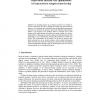Free Online Productivity Tools
i2Speak
i2Symbol
i2OCR
iTex2Img
iWeb2Print
iWeb2Shot
i2Type
iPdf2Split
iPdf2Merge
i2Bopomofo
i2Arabic
i2Style
i2Image
i2PDF
iLatex2Rtf
Sci2ools
127
click to vote
UM
2001
Springer
2001
Springer
Utility-Based Decision Tree Optimization: A Framework for Adaptive Interviewing
Abstract: An emerging practice in e-commerce systems is to conduct interviews with buyers in order to identify their needs. The goal of such an interview is to determine sets of products that match implicit requirements. Decision trees structure the interview process by defining which question follows a given answer. One problem related to decision trees is that changes in the selling strategy or product mix require complex tree restructuring efforts. In this paper we present a framework that represents the selling strategy as a set of parameters, reflecting the preferences of sellers and buyers. This representation of the strategy can be used to generate optimized decision trees in an iterative process, which exploits information about historical buyer behavior. Furthermore, the framework also supports advanced optimization strategies such as minimizing the user exit risk and reasoning about the set of proposed products.
Related Content
| Added | 30 Jul 2010 |
| Updated | 30 Jul 2010 |
| Type | Conference |
| Year | 2001 |
| Where | UM |
| Authors | Markus Stolze, Michael Ströbel |
Comments (0)

